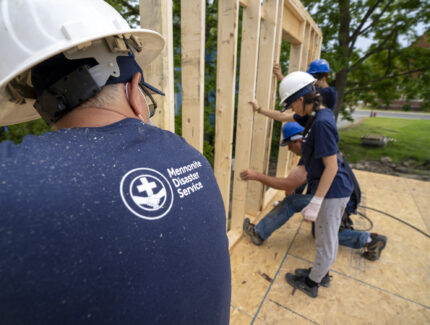


November 9, 2020
At Rocky Mountain Mennonite Camp, MDS volunteers are saving the forest—one tree at a time
At the 100-acre Rocky Mountain Mennonite Camp in Divide, Colo., Mennonite Disaster Service (MDS) volunteers removed trees infested by spruce beetles, an effort that combined care for the forest, wildfire mitigation, and a safer camp for the many groups that come to enjoy the rugged wilderness of the majestic Rockies.
In a note of appreciation to MDS Executive Director Kevin King, the camp’s executive director, Corbin Graber, thanked volunteers for “their continued support and passion in responding.” Graber oversees the camp’s many programs, which help people of all ages experience transformative Christian growth.
“We couldn’t have asked for a better combination of people, weather, equipment and safety for a significant project accomplished,” Graber wrote. “You’ve got top-notch folk representing MDS out here in the West!”
The seven volunteers who helped in October were continuing a long tradition—going back more than a decade—of MDS helping at the camp.
Removing trees infested by spruce beetles is important for three reasons.
First, since the pests move from one tree to another they can kill large swaths of the forest if left unabated.
Second, dead trees turn a forest into a tinderbox in an area already at risk for wildfires.
Finally, trees killed by the beetles can have limbs that sometimes hang precariously over camp buildings, or over areas heavily trafficked by campers.
While dealing with the beetles is not a typical disaster response for MDS, volunteer Paul Unruh, who also served on the MDS board for 23 years, believes it is accomplishing MDS’s mission by helping the camp mitigate disaster. “This work removing trees is potentially helping the camp avoid a disastrous fire,” he said.
Over the years, camp staff, after consulting with forest experts from Colorado State University, have become more adept at recognizing the early stages of bark beetle infestation.
This year there were fewer volunteers than in the the past, due to restrictions related to COVID-19, and most did not stay for a full week.
“We had a very limited crew with a targeted goal of taking down the most difficult trees hanging over buildings or in areas in frequent use by campers,” said Unruh. “We didn’t remove a large number of trees, but we did remove the most difficult ones.”
Using a rented 85-foot high bucket lift, as well as a wood chipper owned by MDS, volunteers were able to remove or trim 15 trees. Some of the wood was taken to a local family-owned sawmill, some will be used for firewood, some was chipped for use as playground mulch, and some was salvaged by a luthier.
“Nothing is wasted,” pointed out volunteer Ray Beggs, who operated the wood chipper.
At the same time, losing the majestic trees—the area is home to some of the largest stands of Engelmann spruce in North America—is painful to see.
“When you think about it taking 150 or 200 years to grow a tree suitable for making a guitar, it’s hard to see these beautiful, beautiful trees get sick. We want to stop that infestation,” said Beggs.
The group, organized through MDS Colorado, worked hard, he said, but they enjoyed themselves, too.
“I liked working with that great group of people. They were just fun to be around, ” said Beggs, who lives about an hour’s drive from the camp.
“After a week’s worth of work, I came home and I was so tired—but a very good kind of tired.”
Volunteer Marc Yoder, retired academic dean of Hesston College in Kansas, has been helping at the camp for a decade. His job was to transport the felled trees to the sawmill. Since the camp is an hour-and-a-half drive from his home, he was able to stay overnight part of the week, while other days he made the drive back and forth.
Yoder noted that, over all the years MDS has been removing trees, they have taken out about 400 altogether. “Out of about 70,000 trees in the camp. that’s less than one percent,” he said.
Through these efforts, the volunteers have saved many trees from infestation, he said, adding this year lessening fire risk seems even more important.
“We have watched terrible fires going on in Colorado this year,” said Yoder, who had to evacuate with his family in 2011 when a wildfire raged within a few miles from his home.
“When you see dead tree after dead tree, you think about how well we are doing at the camp to protect the trees that are there,” he said.
“We’re averting a disaster. I think our work there is an opportunity to be working in stewardship—the stewardship of the earth.”
Susan Kim, Writer



